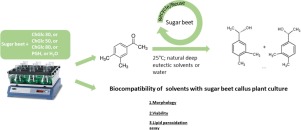当前位置:
X-MOL 学术
›
Process Biochem.
›
论文详情
Our official English website, www.x-mol.net, welcomes your
feedback! (Note: you will need to create a separate account there.)
Natural deep eutectic solvents are viable solvents for plant cell culture-assisted stereoselective biocatalysis
Process Biochemistry ( IF 3.7 ) Pub Date : 2020-06-01 , DOI: 10.1016/j.procbio.2020.03.020 Dubravko Pavoković , Karla Košpić , Manuela Panić , Ivana Radojčić Redovniković , Marina Cvjetko Bubalo
Process Biochemistry ( IF 3.7 ) Pub Date : 2020-06-01 , DOI: 10.1016/j.procbio.2020.03.020 Dubravko Pavoković , Karla Košpić , Manuela Panić , Ivana Radojčić Redovniković , Marina Cvjetko Bubalo

|
Abstract We report a plant (Beta vulgaris L. subsp. vulgaris.) cell culture-mediated reduction of prochiral 1-(3,4-dimethylphenyl)ethanone into the chiral alcohol (1R)-1-(3,4-dimethylphenyl)ethanol in natural deep eutectic solvents (NADES). To the best of our knowledge, this is the first report on plant culture cell behaviour during incubation in these solvents, where the novelty is transformation in callus culture. Three different choline chloride-based NADES (aqueous solutions containing 30, 50 and 80 % water [w/w]) containing sugar (glucose) or polyalcohols (glycerol and ethylene glycol) were screened for conversion and enantiomeric excess during the bioreduction. Both the conversion and the enantiomeric excess differed considerably when using different hydrogen bond donors, with the (R)-alcohol configuration predominating in the reactions conducted in most NADES. Changing the water content in NADES also altered the enantioselectivity. Testing the biocompatibility of NADES with sugar beet cell cultures revealed that NADES cause permeabilisation of cell membranes, leading to stress conditions that change plant metabolism. The potential for recycling and reusing plant biomass was tested for sugar beet cell cultures. The results indicate that recycling may be possible after 3–7 days of incubation, but longer incubations lead to too high a toxicity to cellular metabolism.
中文翻译:

天然低共熔溶剂是植物细胞培养辅助立体选择性生物催化的可行溶剂
摘要 我们报告了一种植物 (Beta vulgaris L. subsp. vulgaris.) 细胞培养介导的将前手性 1-(3,4-二甲基苯基) 乙酮还原为手性醇 (1R)-1-(3,4-二甲基苯基) 乙醇在天然低共熔溶剂 (NADES) 中。据我们所知,这是关于在这些溶剂中孵育期间植物培养细胞行为的第一份报告,其中的新颖之处在于愈伤组织培养中的转化。筛选了三种不同的基于氯化胆碱的 NADES(含有 30、50 和 80% 水 [w/w] 的水溶液),其中包含糖(葡萄糖)或多元醇(甘油和乙二醇)在生物还原过程中的转化率和对映体过量。当使用不同的氢键供体时,转化率和对映体过量都有很大差异,(R)-醇构型在大多数 NADES 中进行的反应中占主导地位。改变 NADES 中的水含量也改变了对映选择性。用甜菜细胞培养物测试 NADES 的生物相容性表明,NADES 会导致细胞膜透化,从而导致改变植物代谢的压力条件。对甜菜细胞培养物的回收和再利用植物生物质的潜力进行了测试。结果表明,在孵育 3-7 天后可能进行再循环,但更长的孵育时间会导致对细胞代谢的毒性过高。导致改变植物代谢的胁迫条件。对甜菜细胞培养物的回收和再利用植物生物质的潜力进行了测试。结果表明,在孵育 3-7 天后可能进行再循环,但更长的孵育时间会导致对细胞代谢的毒性过高。导致改变植物代谢的胁迫条件。对甜菜细胞培养物的回收和再利用植物生物质的潜力进行了测试。结果表明,在孵育 3-7 天后可能进行再循环,但更长的孵育时间会导致对细胞代谢的毒性过高。
更新日期:2020-06-01
中文翻译:

天然低共熔溶剂是植物细胞培养辅助立体选择性生物催化的可行溶剂
摘要 我们报告了一种植物 (Beta vulgaris L. subsp. vulgaris.) 细胞培养介导的将前手性 1-(3,4-二甲基苯基) 乙酮还原为手性醇 (1R)-1-(3,4-二甲基苯基) 乙醇在天然低共熔溶剂 (NADES) 中。据我们所知,这是关于在这些溶剂中孵育期间植物培养细胞行为的第一份报告,其中的新颖之处在于愈伤组织培养中的转化。筛选了三种不同的基于氯化胆碱的 NADES(含有 30、50 和 80% 水 [w/w] 的水溶液),其中包含糖(葡萄糖)或多元醇(甘油和乙二醇)在生物还原过程中的转化率和对映体过量。当使用不同的氢键供体时,转化率和对映体过量都有很大差异,(R)-醇构型在大多数 NADES 中进行的反应中占主导地位。改变 NADES 中的水含量也改变了对映选择性。用甜菜细胞培养物测试 NADES 的生物相容性表明,NADES 会导致细胞膜透化,从而导致改变植物代谢的压力条件。对甜菜细胞培养物的回收和再利用植物生物质的潜力进行了测试。结果表明,在孵育 3-7 天后可能进行再循环,但更长的孵育时间会导致对细胞代谢的毒性过高。导致改变植物代谢的胁迫条件。对甜菜细胞培养物的回收和再利用植物生物质的潜力进行了测试。结果表明,在孵育 3-7 天后可能进行再循环,但更长的孵育时间会导致对细胞代谢的毒性过高。导致改变植物代谢的胁迫条件。对甜菜细胞培养物的回收和再利用植物生物质的潜力进行了测试。结果表明,在孵育 3-7 天后可能进行再循环,但更长的孵育时间会导致对细胞代谢的毒性过高。











































 京公网安备 11010802027423号
京公网安备 11010802027423号